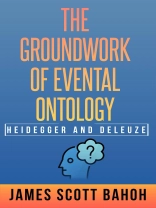Throughout the history of Western philosophy, events have most often been assigned a secondary or derivative status with respect to substances or subjects, which are taken to underwrite them. An event, for instance, is understood to be a modification of the attributes of a substance. Linguistically, this framework is replicated in our grammar: a sentence begins with a subject and a predicate, while an event is represented as a change in predicate. However, since the 1930s, a number of philosophers have argued that no ontology can be sufficient without assigning events a primary, fundamental, and ontologically positive status in their own right.1 Remarkably, many have further argued that no ontology can be sufficient without assigning being an evental nature itself.2 In other words, they have advanced what I will call ‘evental ontologies.’ Many of the central texts arguing for evental ontologies are exceptionally difficult to interpret, and this is often a result of the way their arguments undermine the technical vocabulary of the tradition and its grammar built around subject predication. As a consequence, the reasons for taking such a position are frequently glossed over in relevant scholarship, which opts for either uncritical adoption of the terminology of evental ontologies or the dismissal of them on the grounds of their conceptual obscurity and seeming contrivance.
James Scott Bahoh
Heidegger and Deleuze [EPUB ebook]
The Groundwork of Evental Ontology
Heidegger and Deleuze [EPUB ebook]
The Groundwork of Evental Ontology
Mua cuốn sách điện tử này và nhận thêm 1 cuốn MIỄN PHÍ!
Ngôn ngữ Anh ● định dạng EPUB ● Trang 414 ● ISBN 9781805240204 ● Kích thước tập tin 0.3 MB ● Nhà xuất bản cerebrate ● Được phát hành 2023 ● Phiên bản 1 ● Có thể tải xuống 24 tháng ● Tiền tệ EUR ● TÔI 8824639 ● Sao chép bảo vệ Adobe DRM
Yêu cầu trình đọc ebook có khả năng DRM












